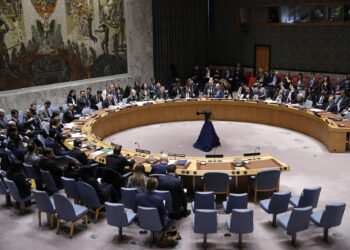Afrah Nasser is a non-resident fellow at the Arab Center Washington DC. She is a recipient of the Committee to Protect Journalists’ International Press Freedom Award and formerly worked as a Yemen researcher at Human Rights Watch.
Imagine being forcibly taken from your home, your office or the street, and disappearing without any trace. Your family has no idea where you are. This is the grim reality for thousands in Yemen today who have been arbitrarily detained without any due process. Although there are no official and up-to-date statistics about the number of detainees, the systematic nature of these enforced disappearances suggests that thousands of people are being held incommunicado across Yemen.
The Houthis, who have controlled Yemen's capital, Sana'a, since 2014, have recently arrested and forcibly disappeared dozens of civil society workers and at least 13 staff members for the United Nations, according to Human Rights Watch. Among the NGO workers reportedly detained are a woman, her husband and their two young children: a 3-year-old and a 9-month-old baby. "We are extremely concerned about the Houthi de facto authorities' recent detention of 17 members of our organizations and many others associated with civil society organizations, national and international NGOs, and other organizations supporting humanitarian activities," the directors of many U.N. organizations and international NGOs working in Yemen said in a joint statement earlier this month. "These detentions are unprecedented—not only in Yemen but globally—and directly impede our ability to reach the most vulnerable people in Yemen, including the 18.2 million people who need humanitarian aid and protection."
A well-informed contact in Sana'a told me that the actual number of people arrested by Houthi security forces could be as high as 60. However, some of their families prefer not to speak publicly about the detentions for fear of reprisal, hoping that staying quiet and seeking intervention or negotiation with the Houthis by respected community leaders might secure their release.
"The Houthis are using arbitrary detentions and enforced disappearances as a political tool at a time when the people living in their territories lack even the most basic needs," said Niku Jafarnia, a Bahrain and Yemen researcher at Human Rights Watch. "The Houthis should immediately release all of these people, many of whom have spent their careers working to improve their country."
As Yemen's conflict has raged on, arbitrary detentions and enforced disappearances have become alarmingly common, and not only in Houthi-controlled areas.
- Afrah Nasser
Yemen's civil conflict escalated after the Houthi takeover of Sana'a in 2014 and the subsequent 2015 military intervention by a coalition led by Saudi Arabia, aiming to restore President Abdrabbuh Mansur Hadi, whose government fled to Aden in southern Yemen. As the conflict raged on, arbitrary detentions and enforced disappearances have become alarmingly common, and not only in Houthi-controlled areas. Various factions in addition to the Houthis, including the Yemeni government and forces backed by the United Arab Emirates, have forcibly detained people to suppress dissent, eliminate opposition, and instill fear among the population. Victims often include political opponents, journalists, citizen journalists, business owners, activists, academics, judges and ordinary citizens perceived as threats.
Going back several years now, extensive reports from both local and international organizations, including Human Rights Watch, Amnesty International, the United Nations Panel of Experts and the U.N. Human Rights Council's Group of Eminent Experts on Yemen, have consistently documented the systematic abuses carried out by all parties involved in Yemen's war. These reports detail how detainees are often held without charge, subjected to torture, receive inadequate medical care and are denied contact with the outside world. Some detainees have even died under torture.
These abuses not only violate Yemeni law but international human rights conventions to which Yemen is a signatory. Arbitrary arrests and enforced disappearances breach constitutional rights; Article 48 of the Yemeni Constitution guarantees personal freedom and security. Yemen is also a signatory to several international human rights treaties, including the International Covenant on Civil and Political Rights, which mandates the protection of individuals against arbitrary arrest and detention.
The rampant violations of these rights have created an environment of fear and impunity where people are too scared to speak out or participate in politics in a country fractured by so many years of war, only worsening Yemen's staggering humanitarian crisis.
As Yemen itself has disintegrated as a state, the "new Yemens" that are emerging are pockets of repression and misery, where power struggles overshadow people's basic rights.
- Afrah Nasser
When I returned to Yemen in 2022, for the first time since 2011, I saw with my own eyes the republic of fear that Sana'a has become under Houthi rule. It was not the city I knew. Green posters with the Houthi slogan—"God is Great, Death to the USA, Death to Israel, Curse the Jews"—were everywhere, and the voice of their leader, Abdul-Malik al-Houthi, seemed to emanate from loudspeakers all over the city. The once-vibrant and hopeful atmosphere of Sana'a, where mass protests in 2011 had helped end then-President Ali Abdullah Saleh's long and repressive rule, had been replaced by a strict culture that glorifies death, as seen in the ever-present Houthi posters of "martyrs," many of whom were children. The Houthis' harsh enforcement of their ideology and the oppressive atmosphere created by the Zaynabiyat—the all-female militia that roams the streets of Sana'a, both as an intelligence and security force—added to the sense of fear and a new kind of repression.
In southern Yemen, areas outside of Houthi control do not fare much better. I have documented significant human rights abuses, including arbitrary detentions and torture, in areas controlled by the UAE-backed Yemeni forces. As Yemen itself has disintegrated as a state, the "new Yemens" that are emerging are pockets of repression and misery, where power struggles overshadow people's basic rights.
All these abuses have exacerbated the already dire humanitarian crisis. There are many flaws with the international humanitarian response and its support for local aid work in Yemen, including a reluctance to condemn such abuses. But arbitrary detention and enforced disappearance, in particular, mean that families of the disappeared often lose their primary breadwinners, leading to economic hardship and increased vulnerability. Communities are torn apart as individuals disappear without a trace, leading to widespread anxiety and insecurity.
It is all a reflection of Yemen's political disintegration as a state. In the face of impunity under both the Houthis and their rivals, Yemenis have no other option but to turn to the outside world for help. Oman or Qatar, with their history of humanitarian mediation in Yemen, could take the lead as key regional players that are not militarily backing one side. But Yemen ultimately needs a political resolution most of all, which is essential for restoring stability, rebuilding the basic functions of state and ensuring the rule of law. Any political deal reached by the warring parties must address the root causes of these human rights abuses and establish accountability mechanisms within the country's governance structures, if there is to be any hope of sustainable peace and justice in Yemen.






































